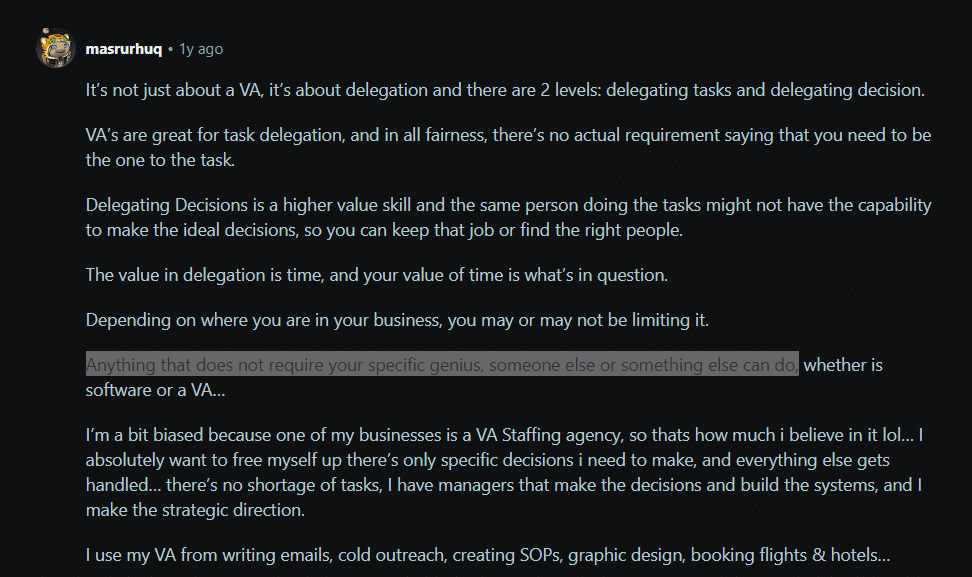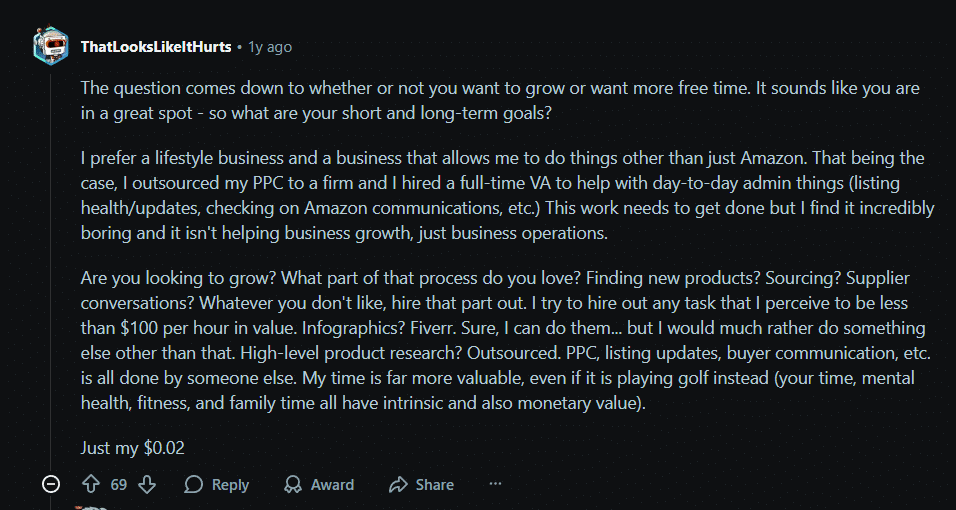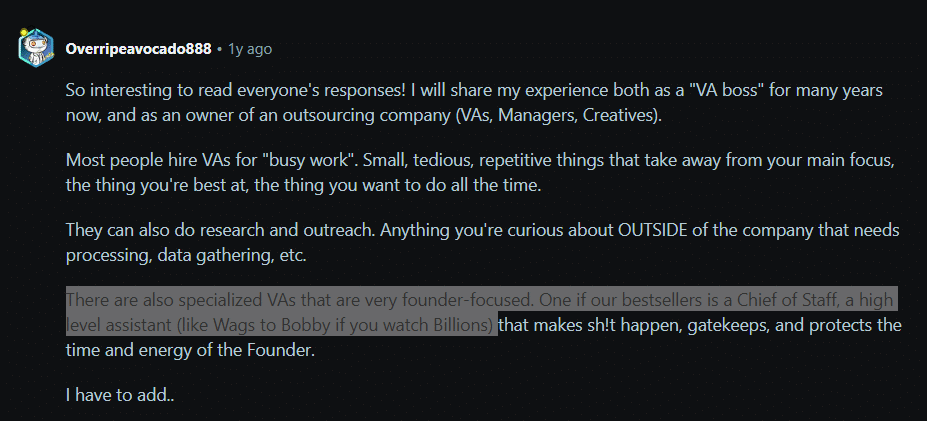
One of the most fascinating things about running a business today is that you can get assistance from people you may never meet. In fact, many entrepreneurs run entire operations powered solely by virtual assistants—no physical offices or face-to-face contact with anyone who works for them.
Decades ago, this may have sounded like a novel idea, but today, it’s the norm. The popularity of several VA options, including managed services and freelancers, serves as a reminder that outsourcing tasks to VAs is here to stay. Virtual Assistants have now become the silent driving force of the new work era.
Still, the question remains: why do people even hire virtual assistants? I found some interesting answers on Reddit. Here, I’ll share some of these real-world answers with you, along with some perspective from my end. Let’s get into it.
Time Savings And Work-Life Balance


For many people, it’s all about time. Besides work, we have other important things in our lives, like hobbies, social bonds, family connections, religious practices, exercise, side projects, or even another business. All have one thing in common—they need time, and that’s where VAs help.
Did you notice how some of these things we need time for are not even financially profitable? You won’t earn more money by spending time with your family or doing more exercise. Yet, they are necessary aspects of living. They support a healthy work-life balance and make you a well-rounded person. When your work and other aspects of your life are balanced, you show up for your work with more focus, creativity, and calm.
Focus On Core Strengths

Guess what happens when you do things that aren’t your core skills? Maybe you’re a marketing consultant, but you spend half your day designing social media graphics and replying to customer emails. First, you experience a delay, taking hours to design what a professional can do in minutes, and you may not even deliver excellent quality.
Then your focus scatters across many tasks—visuals, strategy, inboxes—which opens doors to mistakes and, if you work for clients, can lead to distrust in your business relationships. The work you enjoy takes a back seat, and eventually, burnout creeps in.
The response in the image above is quite long, but what I highlighted is my takeaway from it. Someone else (a VA) or something else (an AI tool, I believe) should handle anything that doesn’t require your specific skills, while you give your full time and attention to the tasks that specifically need your input.
Business Growth

There’s a lot to learn from this comment, but my big lesson is this: just because a business’s operations are in a great place doesn’t mean the company is actually growing.
Consider a coach who spends hours scheduling calls, managing invoices, updating spreadsheets, and answering routine client emails. If they can do all these things properly, the business operations will look organized. However, there may be no time for creating new programs or attracting fresh clients.
Now, this coach may actually be good at many things, such as creating videos about the business or managing their own social media pages. Hiring remote workers for these tasks may feel like paying for a skill they already have. But when growth is more important, VAs help keep the operations running smoothly while the entrepreneur focuses on growth without distractions.
Access To Specialized Skills

While many people hire virtual assistants for basic tasks, like email management, others tap into more specialized and creative roles. In the VA market, there’s almost no skill you can’t find—web development, data analytics, podcast production, SEO optimization, you name it. And thankfully, there are no physical or geographic limitations with VAs, so you can get the skill of your choice, no matter where the VA lives.
Even if you have in-house employees, their work can be enhanced by a VA. Take, for example, a small marketing team whose work covers content creation, client communication, campaign reporting, and social scheduling. They may be talented, but sometimes, they may feel stretched thin, which affects their work quality.
So, you bring in a VA skilled in automation and data analytics, and they create workflows that collect data from multiple platforms, organize performance reports, and schedule posts. With their input, your team suddenly gets hours back each week that can be used for testing new ideas and refining creative direction. Workload gets lighter and performance improves.
Cost-Effectiveness
Here’s a screenshot I shared before, but this time, I have highlighted an important aspect of it:

The difference between what you’ll pay a VA and a full-time employee can be significant. Full-time staff typically come with additional costs such as benefits, paid leave, and training expenses. VAs, on the other hand, charge by the hour or on a monthly basis—so you only pay for the work that actually gets done.
For small businesses and startups, this flexibility can make a big difference. Hiring full-time specialists too early—say, a graphic designer or video editor—can tie up funds unnecessarily, especially when their work is only needed a few times a month. In such cases, it makes more sense to bring in remote professionals on demand and invest those savings into growth. As the business expands and the workload becomes steady, transitioning those roles to full-time positions becomes more practical.
Freedom To Delegate Non-Critical Tasks

Running a business involves critical and non-critical tasks. The difference? Critical tasks are delicate and must be handled with extra care and precision, as they can derail business progress if not done correctly. I’m not saying that the non-critical ones should be taken lightly, but that their impact isn’t as heavy as that of the critical functions.
Negotiating a major client contract is an example of a critical task. When done right, it boosts the business’s revenue and earns it a good, long-term relationship. You want to handle such tasks by yourself instead of organizing meeting notes or scheduling social media posts. One delayed social media post is not likely to affect your business stability.
When you have VAs working with you, you can push these non-critical tasks their way as they come. Your focus remains on the ones that majorly impact your business, and your interaction with your VAs will be to guide them instead of juggling all tasks.
Mental Space And Headspace

Have you ever heard of mental clutter? It happens when it feels like there’s a lot going on in your head. When you have many things to do, you unconsciously start planning them out, and that can make your mind feel cluttered.
Let’s say your tasks for today include reviewing a freelancer’s contract, checking ad performance, confirming a podcast guest, researching competitors’ pricing, and writing a proposal for a new client. Before you even open your laptop, your mind’s already sprinting in five directions.
It’s harder to focus on one task when you have four others demanding your attention, especially when it feels like there isn’t enough time to do them all. Also, even if you don’t do all these tasks every day, worrying about them may just be enough to lead to burnout.
Offloading most of these tasks to VAs not only frees up time for you to focus on critical or core tasks but also provides the headspace to give your best effort.
FAQs
Here I’ll provide a few answers to common questions regarding the topic. Let’s begin.
Q: How much do Virtual Assistants cost?
We have a broader article on how much virtual assistants really cost. You can check it out for more about this question, but for now, I’ll try to summarize the answer in a few words. Many factors determine the cost of a VA, including their location, type, and skill specialization. VAs in the US often cost more than those in India, the Philippines, or Africa, while executive VAs cost more than specialized VAs, who in turn cost more than general admin VAs. In the US, VAs can cost anywhere from $20 to $60+ per hour, but in India, they commonly go for $3 to $10.
Q: Can VAs work for any type of business?
Virtual assistants are simply people who provide services remotely. So, as long as a business requires a skill that can be offered without the provider being in the same location, a VA can work for them. Even manufacturing companies that require many workers to be physically present can benefit from VAs. They can assist with inventory data entry, supplier coordination, payroll processing, order tracking, email correspondence, and customer service inquiries. Some even manage digital filing systems or help prepare compliance reports.
Q: How do you manage a VA remotely?
There are several ways to go about managing VAs remotely, but I’ll share two here. One approach is to hire a manager to oversee VA activities. They’ll stand as the middleman between you and your VAs, handle communication with them, and review the quality of their work before it gets to you. The other approach is to work with a managed VA service like Klarecon that handles all aspects of working with VAs for you—from hiring to training and daily management—while you focus on core and critical tasks.
